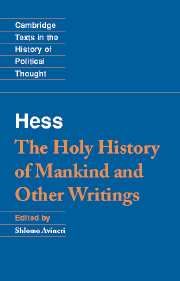Book contents
- Frontmatter
- Contents
- Introduction
- Chronology of the life of Moses Hess
- A note on the text
- Bibliographical note
- The Holy History of Mankind
- Dedication
- PART ONE THE PAST AS THE FOUNDATION OF WHAT WOULD HAPPEN
- PART TWO THE FUTURE, AS THE CONSEQUENCE OF WHAT HAS HAPPENED
- Appendix: Christ and Spinoza (from Rome and Jerusalem)
- Index
- CAMBRIDGE TEXTS IN THE HISTORY OF POLITICAL THOUGHT
Appendix: Christ and Spinoza (from Rome and Jerusalem)
Published online by Cambridge University Press: 05 June 2012
- Frontmatter
- Contents
- Introduction
- Chronology of the life of Moses Hess
- A note on the text
- Bibliographical note
- The Holy History of Mankind
- Dedication
- PART ONE THE PAST AS THE FOUNDATION OF WHAT WOULD HAPPEN
- PART TWO THE FUTURE, AS THE CONSEQUENCE OF WHAT HAS HAPPENED
- Appendix: Christ and Spinoza (from Rome and Jerusalem)
- Index
- CAMBRIDGE TEXTS IN THE HISTORY OF POLITICAL THOUGHT
Summary
In Rome and Jerusalem Hess articulated for the first time his project for the establishment of a Jewish socialist commonwealth in Palestine. Under the impact of the wars of Italian liberation and unification, Hess developed his view that human emancipation depends on a double path of liberation – social as well as national. He thus emphatically rejected his earlier views that the future of the Jews lies in integration into a radicalized revolutionary universalistic socialism, and his book is considered one of the first calls for what would later be called a Zionist approach to the future of the Jewish people.
While his political solution thus differs from that enunciated in his early writings, there is a continuity in his assessment of Spinoza, and also in the role he attributes to Jesus in world history. The following passages from Rome and Jerusalem attest to this aspect of continuity in Hess' thinking.
A Judaism reconciled with science [Wissenschaft] can do full justice to Christianity, fully acknowledge its world-historical significance, without falling into the pitfall of the shallow cosmopolitanism of the levelling tendencies of Reform Judaism, and without denying the character of Jewish religion. Today a Jewish historian does not need to relate fanatically or with indifference to a religion which is itself a product and consequently an essential component of Jewish history itself.
- Type
- Chapter
- Information
- Moses Hess: The Holy History of Mankind and Other Writings , pp. 136 - 139Publisher: Cambridge University PressPrint publication year: 2004



